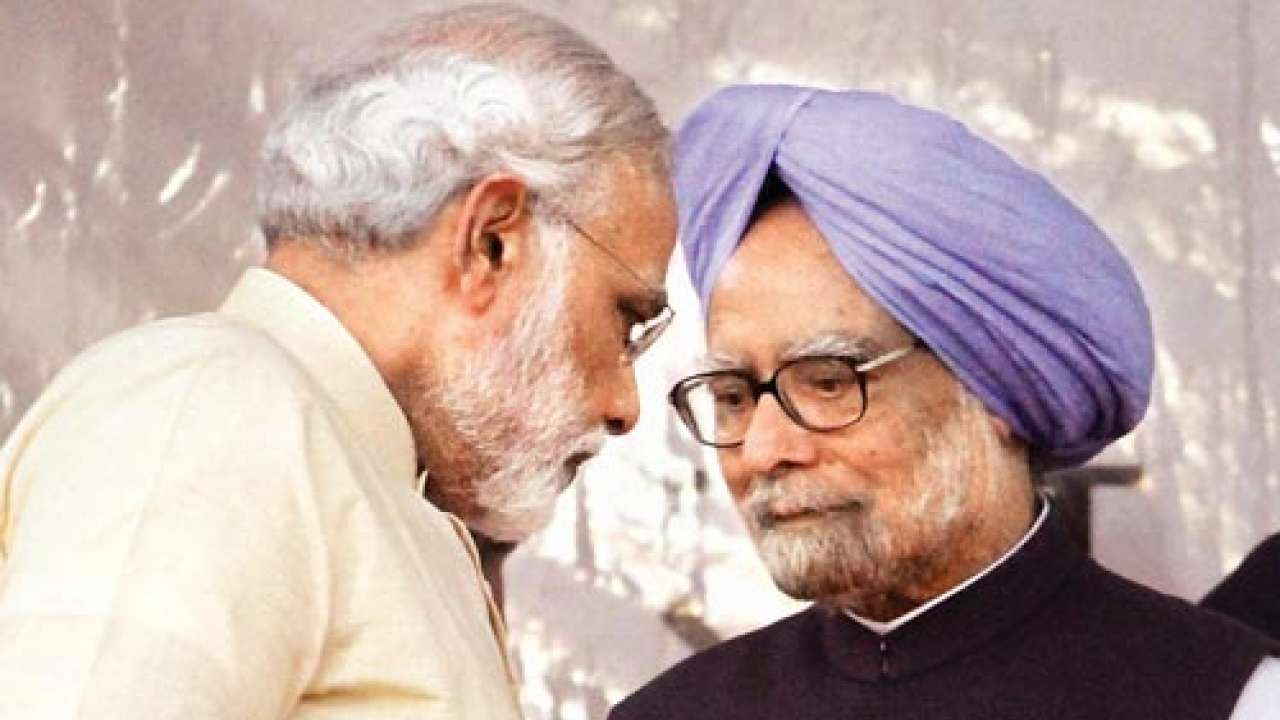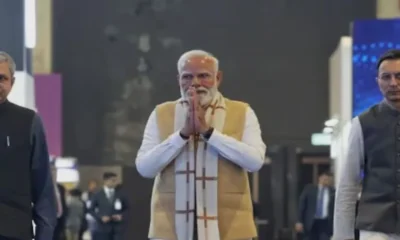[vc_row][vc_column][vc_column_text]
Former Prime Minister Dr Manmohan Singh say desperate Narendra Modi spreading falsehoods, has insatiable desire to tarnish every constitutional office
In a strongly-worded rebuke, Dr Manmohan Singh on Monday demanded an apology from Prime Minister Narendra Modi for alleging that the Congress was conspiring with Pakistan to influence the outcome of the ongoing Gujarat Assembly polls.
[/vc_column_text][vc_raw_html]JTNDYmxvY2txdW90ZSUyMGNsYXNzJTNEJTIydHdpdHRlci10d2VldCUyMiUyMGRhdGEtbGFuZyUzRCUyMmVuJTIyJTNFJTNDcCUyMGxhbmclM0QlMjJlbiUyMiUyMGRpciUzRCUyMmx0ciUyMiUzRVN0YXRlbWVudCUyMGZyb20lMjBGb3JtZXIlMjBQcmltZSUyME1pbmlzdGVyJTIwRHIuJTIwTWFubW9oYW4lMjBTaW5naCUyMG9uJTIwdGhlJTIwZmFsc2Vob29kcyUyMGJlaW5nJTIwc3ByZWFkJTIwdG8lMjBzY29yZSUyMHBvbGl0aWNhbCUyMHBvaW50cyUyQyUyMGluJTIwYSUyMGxvc3QlMjBjYXVzZSUyMGJ5JTIwUE0lMjBNb2RpLiUyMCUzQ2ElMjBocmVmJTNEJTIyaHR0cHMlM0ElMkYlMkZ0LmNvJTJGWDIwWDNvZWVZdyUyMiUzRXBpYy50d2l0dGVyLmNvbSUyRlgyMFgzb2VlWXclM0MlMkZhJTNFJTNDJTJGcCUzRSUyNm1kYXNoJTNCJTIwQ29uZ3Jlc3MlMjAlMjglNDBJTkNJbmRpYSUyOSUyMCUzQ2ElMjBocmVmJTNEJTIyaHR0cHMlM0ElMkYlMkZ0d2l0dGVyLmNvbSUyRklOQ0luZGlhJTJGc3RhdHVzJTJGOTQwMTczMjIwMTMyNTM2MzIwJTNGcmVmX3NyYyUzRHR3c3JjJTI1NUV0ZnclMjIlM0VEZWNlbWJlciUyMDExJTJDJTIwMjAxNyUzQyUyRmElM0UlM0MlMkZibG9ja3F1b3RlJTNFJTBBJTBBJTNDc2NyaXB0JTIwYXN5bmMlMjBzcmMlM0QlMjJodHRwcyUzQSUyRiUyRnBsYXRmb3JtLnR3aXR0ZXIuY29tJTJGd2lkZ2V0cy5qcyUyMiUyMGNoYXJzZXQlM0QlMjJ1dGYtOCUyMiUzRSUzQyUyRnNjcmlwdCUzRQ==[/vc_raw_html][vc_column_text]
The otherwise mild-mannered Singh said he was “pained and anguished by the falsehoods and canards being spread to score political points in a lost cause by none less that Prime Minister Narendra Modi”. The former Prime Minister’s statement came as his response to an outlandish allegation made by Modi during an election rally in Palanpur, Gujarat on Sunday.
Modi had claimed that on December 6, there was a “meeting at (suspended Congress leader) Mani Shankar Aiyar’s house (in New Delhi). It was attended by Pakistan’s high commissioner, Pakistan’s former foreign minister, India’s former vice-president (Hamid Ansari) and former prime minister Manmohan Singh. The meeting at Aiyar’s house carried on for almost three hours”.
[/vc_column_text][vc_raw_html]JTNDYmxvY2txdW90ZSUyMGNsYXNzJTNEJTIydHdpdHRlci10d2VldCUyMiUyMGRhdGEtbGFuZyUzRCUyMmVuJTIyJTNFJTNDcCUyMGxhbmclM0QlMjJlbiUyMiUyMGRpciUzRCUyMmx0ciUyMiUzRUlzJTIwd2lubmluZyUyMGFuJTIwZWxlY3Rpb24lMjBzbyUyMGltcG9ydGFudCUyMHRoYXQlMjBzdWNoJTIwYWxsZWdhdGlvbnMlMjBjYW4lMjBiZSUyMG1hZGUlMjBhZ2FpbnN0JTIwYSUyMGZvcm1lciUyMFByaW1lJTIwTWluaXN0ZXIlMjBhbmQlMjBhJTIwZm9ybWVyJTIwVmljZSUyMFByZXNpZGVudCUzRiUzQyUyRnAlM0UlMjZtZGFzaCUzQiUyMFAuJTIwQ2hpZGFtYmFyYW0lMjAlMjglNDBQQ2hpZGFtYmFyYW1fSU4lMjklMjAlM0NhJTIwaHJlZiUzRCUyMmh0dHBzJTNBJTJGJTJGdHdpdHRlci5jb20lMkZQQ2hpZGFtYmFyYW1fSU4lMkZzdGF0dXMlMkY5NDAxNDIwNDcyMDk1NjIxMTIlM0ZyZWZfc3JjJTNEdHdzcmMlMjU1RXRmdyUyMiUzRURlY2VtYmVyJTIwMTElMkMlMjAyMDE3JTNDJTJGYSUzRSUzQyUyRmJsb2NrcXVvdGUlM0UlMEElMEElM0NzY3JpcHQlMjBhc3luYyUyMHNyYyUzRCUyMmh0dHBzJTNBJTJGJTJGcGxhdGZvcm0udHdpdHRlci5jb20lMkZ3aWRnZXRzLmpzJTIyJTIwY2hhcnNldCUzRCUyMnV0Zi04JTIyJTNFJTNDJTJGc2NyaXB0JTNF[/vc_raw_html][vc_raw_html]JTNDYmxvY2txdW90ZSUyMGNsYXNzJTNEJTIydHdpdHRlci10d2VldCUyMiUyMGRhdGEtbGFuZyUzRCUyMmVuJTIyJTNFJTNDcCUyMGxhbmclM0QlMjJoaSUyMiUyMGRpciUzRCUyMmx0ciUyMiUzRSVFMCVBNCU5NyVFMCVBNSU4MSVFMCVBNCU5QyVFMCVBNCVCMCVFMCVBNCVCRSVFMCVBNCVBNCUyMCVFMCVBNCVBRSVFMCVBNSU4NyVFMCVBNCU4MiUyMCVFMCVBNCU5QSVFMCVBNSU4MSVFMCVBNCVBOCVFMCVBNCVCRSVFMCVBNCVCNSUyMCVFMCVBNCVBQSVFMCVBNSU4RCVFMCVBNCVCMCVFMCVBNCU5QSVFMCVBNCVCRSVFMCVBNCVCMCUyMCVFMCVBNCU5NSVFMCVBNSU4NyUyMCVFMCVBNCVBNiVFMCVBNSU4QyVFMCVBNCVCMCVFMCVBNCVCRSVFMCVBNCVBOCUyMCVFMCVBNCVBQSVFMCVBNSU4RCVFMCVBNCVCMCVFMCVBNCVBNyVFMCVBNCVCRSVFMCVBNCVBOCVFMCVBNCVBRSVFMCVBNCU4MiVFMCVBNCVBNCVFMCVBNSU4RCVFMCVBNCVCMCVFMCVBNSU4MCUyMCVFMCVBNCVBOCVFMCVBNCVCMCVFMCVBNSU4NyVFMCVBNCVBOCVFMCVBNSU4RCVFMCVBNCVBNiVFMCVBNSU4RCVFMCVBNCVCMCUyMCVFMCVBNCVBRSVFMCVBNSU4QiVFMCVBNCVBNiVFMCVBNSU4MCUyMCVFMCVBNCVBNiVFMCVBNSU4RCVFMCVBNCVCNSVFMCVBNCVCRSVFMCVBNCVCMCVFMCVBNCVCRSUyMCVFMCVBNCVCMiVFMCVBNCU5NyVFMCVBNCVCRSVFMCVBNCVBRiVFMCVBNSU4NyUyMCVFMCVBNCU5NyVFMCVBNCVBRiVFMCVBNSU4NyUyMCVFMCVBNCVBOCVFMCVBNCVCRiVFMCVBNCVCMCVFMCVBNCVCRSVFMCVBNCVBNyVFMCVBNCVCRSVFMCVBNCVCMCUyMCVFMCVBNCU4NiVFMCVBNCVCMCVFMCVBNSU4QiVFMCVBNCVBQSVFMCVBNSU4QiVFMCVBNCU4MiUyMCVFMCVBNCVBQSVFMCVBNCVCMCUyMCVFMCVBNCU5NSVFMCVBNCVCRSVFMCVBNCU4MiVFMCVBNCU5NyVFMCVBNSU4RCVFMCVBNCVCMCVFMCVBNSU4NyVFMCVBNCVCOCUyMCVFMCVBNCU5NSVFMCVBNSU4NyUyMCVFMCVBNCVCNSVFMCVBNCVCMCVFMCVBNCVCRiVFMCVBNCVCNyVFMCVBNSU4RCVFMCVBNCVBMCUyMCVFMCVBNCVBOCVFMCVBNSU4NyVFMCVBNCVBNCVFMCVBNCVCRSUyMCUzQ2ElMjBocmVmJTNEJTIyaHR0cHMlM0ElMkYlMkZ0d2l0dGVyLmNvbSUyRkFuYW5kU2hhcm1hSU5DJTNGcmVmX3NyYyUzRHR3c3JjJTI1NUV0ZnclMjIlM0UlNDBBbmFuZFNoYXJtYUlOQyUzQyUyRmElM0UlMjAlRTAlQTQlQTglRTAlQTUlODclMjAlRTAlQTQlQUElRTAlQTUlOEQlRTAlQTQlQjAlRTAlQTQlQTclRTAlQTQlQkUlRTAlQTQlQTglRTAlQTQlQUUlRTAlQTQlODIlRTAlQTQlQTQlRTAlQTUlOEQlRTAlQTQlQjAlRTAlQTUlODAlMjAlRTAlQTQlQUUlRTAlQTUlOEIlRTAlQTQlQTYlRTAlQTUlODAlMjAlRTAlQTQlQjglRTAlQTUlODclMjAlRTAlQTQlQUUlRTAlQTQlQkUlRTAlQTQlQUIlRTAlQTUlODAlMjAlRTAlQTQlQUUlRTAlQTQlQkUlRTAlQTQlODIlRTAlQTQlOTclRTAlQTQlQTglRTAlQTUlODclMjAlRTAlQTQlOTUlRTAlQTUlODAlMjAlRTAlQTQlQUUlRTAlQTQlQkUlRTAlQTQlODIlRTAlQTQlOTclMjAlRTAlQTQlOTUlRTAlQTUlODAlM0NhJTIwaHJlZiUzRCUyMmh0dHBzJTNBJTJGJTJGdC5jbyUyRks5N2J6ZmZxR2glMjIlM0VodHRwcyUzQSUyRiUyRnQuY28lMkZLOTdiemZmcUdoJTNDJTJGYSUzRSUzQyUyRnAlM0UlMjZtZGFzaCUzQiUyMENvbmdyZXNzJTIwJTI4JTQwSU5DSW5kaWElMjklMjAlM0NhJTIwaHJlZiUzRCUyMmh0dHBzJTNBJTJGJTJGdHdpdHRlci5jb20lMkZJTkNJbmRpYSUyRnN0YXR1cyUyRjk0MDEzODA4NjMzNTI2NjgxOCUzRnJlZl9zcmMlM0R0d3NyYyUyNTVFdGZ3JTIyJTNFRGVjZW1iZXIlMjAxMSUyQyUyMDIwMTclM0MlMkZhJTNFJTNDJTJGYmxvY2txdW90ZSUzRSUwQSUwQSUzQ3NjcmlwdCUyMGFzeW5jJTIwc3JjJTNEJTIyaHR0cHMlM0ElMkYlMkZwbGF0Zm9ybS50d2l0dGVyLmNvbSUyRndpZGdldHMuanMlMjIlMjBjaGFyc2V0JTNEJTIydXRmLTglMjIlM0UlM0MlMkZzY3JpcHQlM0U=[/vc_raw_html][vc_column_text]
The Prime Minister had added that a day after this “secret meeting” with Pakistani officials, “Mani Shankar calls Modi ‘neech’ (lowly)” and asserted that “this is a serious and sensitive issue… what is the reason for such a secret meeting amidst Gujarat elections?” Modi had then tried to build a presumably false narrative by claiming that the Congress, with the help of Pakistan, was trying to oust the BJP from Gujarat.
Taking strong umbrage over Modi’s “innuendoes and falsehoods”, Dr Singh said on Monday: “Fearing imminent defeat in Gujarat, desperation of Prime Minister to hurl every abuse and latch on to every straw is palpable. Sadly and regrettably, Modi is setting a dangerous precedent by his insatiable desire to tarnish every constitutional office, including that of a former Prime Minister and Army Chief”.
Notably, former Army Chief General (retired) Deepak Kapoor was also present at the get-together hosted by Mani Shankar Aiyar at his residence in New Delhi on December 9 for former Pakistan foreign minister Khurshid Mahmud Kasuri. On Monday, General (retd) Kapoor also rubbished the allegations leveled by Modi about a conspiracy hatched by Congress leaders and the Pakistan officials and asserted that “only India-Pakistan ties” were discussed at the dinner and that the get-together had “had nothing to do with domestic politics”.
In a scathing attack directed at his successor, Dr Singh said: “The Congress party needs no sermons on ‘nationalism’ from a party and Prime Minister, whose compromised track record in fighting terrorism is well known.”
The former Prime Minister sought to remind Narendra Modi that “he had gone to Pakistan uninvited after the terror attacks in Udhampur and Gurdaspur” and added: “Let him (Modi) also tell the country the reason for inviting the infamous ISI of Pakistan to our strategic Air Base in Pathankot to investigate a terror attack that emanated from Pakistan”.
Dr Singh also released a list of all the dignitaries that were present at the dinner hosted by Mani Shankar Aiyar and asserted that “none of them could be accused of indulging in any anti-national activities”. The list, besides Dr Singh, Mani Shankar Aiyar, Hamid Ansari and General (retd) Deepak Kapoor, also includes names of veteran journalist Prem Shankar Jha, former Union minister K Natwar Singh (whose son Jagat Singh is a member of Modi’s BJP), former High Commissioners of India to Pakistan, TCA Raghavan, KS Bajpai and Sharat Sabharwal, Rahul Singh, son of the late author and journalist Khushwant Singh, among others.
The former Prime Minister hoped that Modi will “maturity and gravitas expected of the high office he holds instead of concentrating his energy solely on erroneously conceived brownie points. I sincerely hope that he will apologise to the Nation for his ill-thought transgression to restore the dignity of the office he occupies”.
Going by Prime Minister Narendra Modi’s past ‘shoot and scoot’ record of making misinformed, often misleading, statements and allegations and then maintaining a studied silence on them when called out, it is unlikely that he would oblige Dr Manmohan Singh with an apology. However, what seems more certain is that the Prime Minister and the BJP would, in the next few days, sharpen their attacks at the Congress with the hope of retaining power in Gujarat.
[/vc_column_text][/vc_column][/vc_row]


 Latest world news18 hours ago
Latest world news18 hours ago
 Latest world news18 hours ago
Latest world news18 hours ago
 India News18 hours ago
India News18 hours ago
 Latest world news9 hours ago
Latest world news9 hours ago













